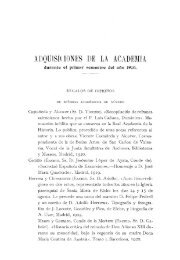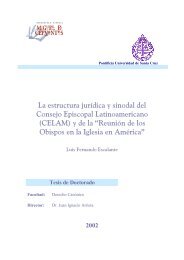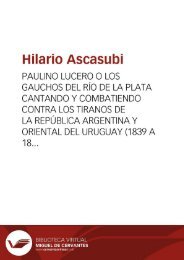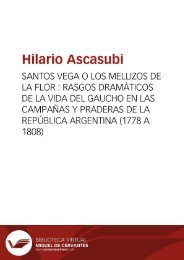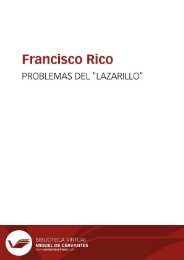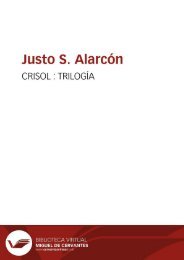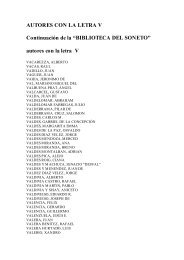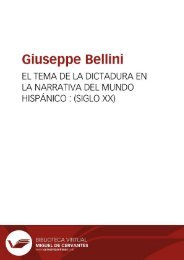You also want an ePaper? Increase the reach of your titles
YUMPU automatically turns print PDFs into web optimized ePapers that Google loves.
Anales galdosianos [Publicaciones periódicas]. Año XII, 1977<br />
wanted: Tristana's complete enslavement, her total physical and emotional dependence on him. Don<br />
Lope's very real mental anguish over her health, his frantic efforts to cure her, in spite of whatever<br />
latent guilt feelings may be present, are designed primarily to make Tristana feel eternally grateful, to<br />
make her morally indebted to him forever. One can only wonder, then, if Don Lope, too, should not be<br />
seen as the incarnation of a part of Tristana herself, an incarnation of her own inertia, self-doubt and<br />
lack of will, her inability to realize her «sacred conviction», the same inertia which manifests itself<br />
physically as her incapacitating illness? In the inner drama taking place in Tristana's psyche, is Don<br />
Lope the negative animus which takes revenge on the Ghostly Lover which was leading her toward<br />
realization of her self, by leading her back, through loss of ego, to unconsciousness? 177<br />
This inner unconscious drama precedes, and indeed, foreshadows the resolution of the external<br />
drama, the fateful encounter with Horacio in which Tristana must ultimately come to terms with<br />
the Ghostly Lover. Tristana intuitively anticipates what the result of this encounter will be. She<br />
is profoundly upset by the news of Horacio's re-appearance on the scene, first trying to deny its<br />
possibility (« abrigaba en su interior cierta desconfianza de la realidad de aquel suceso ») (p. 1604),<br />
then vainly struggling to avoid it. « Al propio tiempo », explains the narrator, « el deseo puramente<br />
humano y egoísta de ver al ser querido, de oírle, luchaba en su alma con aquel desenfundado idealismo,<br />
en virtud del cual, más bien que buscar la aproximación, tendía, sin darse cuenta de ello, a evitarla.<br />
La distancia venía a ser como una voluptuosidad de aquel amor sutil, que pugnaba por desprenderse<br />
de toda influencia de los sentidos ». (p. 1604)<br />
The moment of desengaño is inevitable. As Horacio enters her room, he appears a stranger to<br />
her. She cannot recognize him. His voice is totally foreign to her. The narrator explains: « En los<br />
primeros momentos sintió Tristana una desilusión brusca. Aquel hombre no era el mismo que, borrado<br />
de su memoria por la distancia, habíala ella reconstruido laboriosamente con su facultad creadora<br />
177 M.-L. von Franz explains that in this negative form, «the animus personifies all those semi-<br />
conscious, cold, destructive reflections that invade a woman in the small hours, especially when she<br />
has failed to realize some obligations of feeling... A strange passivity and paralysis of all feeling,<br />
or a deep insecurity that can lead almost to a sense of nullity, may sometimes be the result of an<br />
unconscious animus opinion. In the depths of the woman's being, the animus whispers: 'You are<br />
hopeless. What's the use of trying? There is no point in doing anything. Life will never change for<br />
the better.'» op. cit. , p. 191.<br />
134





